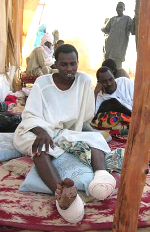African leaders appeal to Sudan combatants to stop attacks on civilians
By GILBERT DA COSTA, Associated Press Writer
ABUJA, Nigeria, Sep 18, 2004 (AP) — African leaders appealed to Sudan’s government and rebel groups to refrain from attacks on civilians despite the breakdown of talks on a peace deal for the bloodied western region of Darfur.
 In a closing ceremony late Friday, the 52-nation African Union called on both sides to uphold an oft-violated cease-fire and ease the plight of civilians in Darfur, where a 19-month conflict has left tens of thousands dead.
In a closing ceremony late Friday, the 52-nation African Union called on both sides to uphold an oft-violated cease-fire and ease the plight of civilians in Darfur, where a 19-month conflict has left tens of thousands dead.
“No effort should be spared to prevent attacks, threats, intimidation or any other form of violence against civilians,” said an AU statement, issued at the culmination of the three-week talks that ended without a major breakthrough.
The AU hosts held out the prospect that delegates could return to the table, but not until October. The talks began in Nigeria’s capital, Abuja, on Aug. 23.
“More efforts are needed to bridge the gap between the parties on the outstanding issues and pave the way for a comprehensive political settlement of the crisis in Darfur,” said the statement.
Talks in Ethiopia in July also broke down without accord.
The rebels insist they will not lay down their arms until government-allied Arab militia accused of attacking, raping and killing ethnic Africans are disarmed.
“If we want to solve the problem in Darfur, it is important to address the problem of security,” said Ahmed Tugod Lissan, a delegate the rebel Justice and Equality Movement, one of two Darfur rebel groups.
Earlier Friday, Sudan’s government pledged a unilateral adherence to the April cease-fire and said it will allow humanitarian agencies unfettered access to areas of Darfur under its control.
Sudan pledges “strict adherence to the cease-fire on land and air, and the commitment to secure and facilitate humanitarian access without any restriction, and make the life in Darfur easier and better,” the statement said.
The rebels say existing accords already provide for relief efforts, and that it is impossible to do more before the government-allied Arab militia — known as Janjaweed — are disarmed.
The United Nations and other international observers accuse Sudan’s government and the Janjaweed of waging a brutal campaign to drive out Darfur’s non-Arab farmers, the rebels’ claimed constituency.
The United States and some aid groups say genocide has already been committed in Darfur – a charge the government denies.
Tens of thousands of people are already dead in Darfur, and 1.2 million people have fled their homes, including 200,000 in refugee camps in neighboring Chad.
The violence broke out with the emergence of two rebel groups after February 2003.
The United Nations calls it the worst humanitarian crisis anywhere.
African leaders hoped to get all sides to sign an agreement facilitating relief in areas under their control, but the three-week-old talks broke down Wednesday amid disagreements over how to bring security to Darfur. The government and one rebel group said no accord was likely soon.
Sudan’s government — under increasingly harsh international criticism and some threat of international sanctions — reiterated charges that the U.S. criticism had boosted rebel intransigence at the talks.
“Statements made by senior officials of the USA poisoned the talks’ environment and sent wrong signals to the rebels who immediately stiffened their positions and contracted sudden disinterest on the talks and discussions and adopted a negative attitude,” the government statement said.
